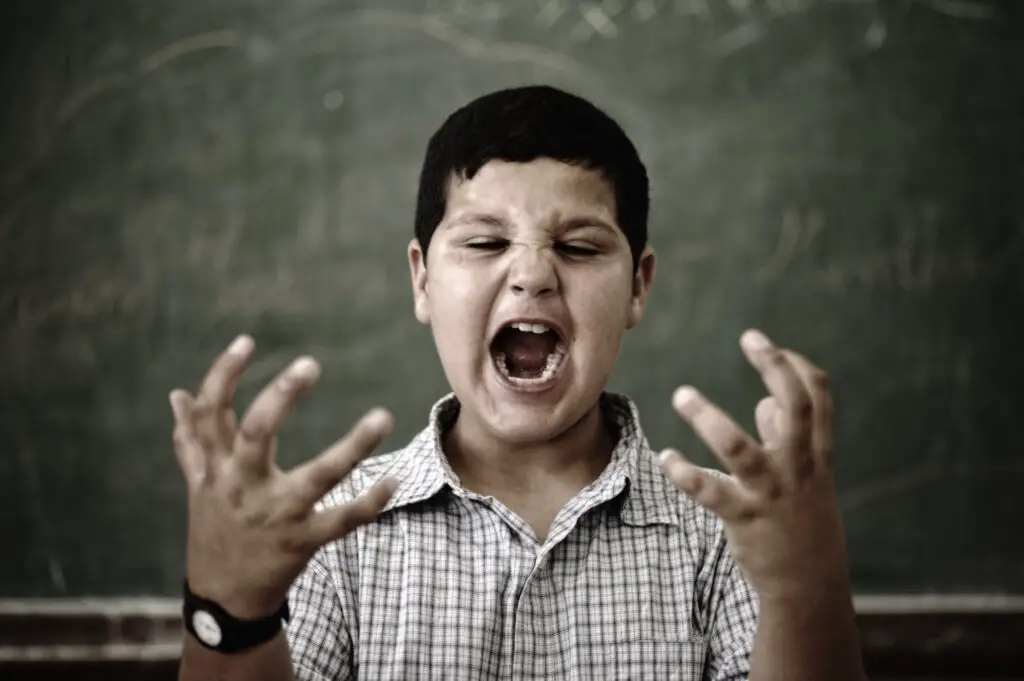1. Talking Back to a Teacher

You probably weren’t trying to start a revolution—you just had a point to make. But if you questioned a teacher’s logic, tone, or instructions (even politely), you were suddenly “disrespectful.” It didn’t matter if you were actually right or just trying to clarify something. Once your words were interpreted as sass, the referral was already half-written shares the Everymom.
Maybe you were trying to stand up for a classmate or call out something unfair. That’s commendable now, but back then, it was grounds for a trip to the principal’s office. Schools loved rules, and talking back—no matter how truthful—was seen as breaking the chain of command. You weren’t defiant, just misunderstood adds Reddit.
2. Correcting the Teacher

It’s tough being the kid who raises their hand and says, “Actually…” But if you caught a teacher in a mistake—even something small—you were often met with a glare instead of a “thank you.” It didn’t matter if you had evidence or if your tone was respectful. You were challenging authority, and that never flew says Quora.
All you wanted was accuracy—maybe you really liked history or math and knew your stuff. Still, that correction made the teacher feel small, and their pride was more protected than your good intentions. Suddenly you were the problem. Off to the principal’s office you went, probably still confused about what exactly you did wrong adds AOL.
3. Laughing at the Wrong Moment

You didn’t plan to laugh—it just happened. Maybe someone whispered a joke during a quiet test, or a weird noise escaped from someone’s backpack and you couldn’t hold it in. You got the look, then the warning, then the “Let’s go,” like you were being dragged off for a crime.
The tricky part? Sometimes the teacher laughed too. But if they were in a bad mood or felt like you were disrupting the vibe, that tiny giggle became a federal offense. You weren’t trying to derail class. You just happened to find joy at the wrong time.
4. Refusing to Apologize for Something You Didn’t Do

It felt like something out of a courtroom drama. You were accused, told to say sorry, and when you didn’t—because you hadn’t actually done it—you were seen as defiant. It didn’t matter that you were standing by your truth. That refusal was seen as rebellion.
Kids were expected to keep the peace, even at the cost of their own integrity. But you weren’t about to fake remorse for something you didn’t say or do. That stubborn little act of honesty cost you a hallway walk to the office. You may have been right, but you still got written up.
5. Wearing Something “Inappropriate”

You thought your shirt with the funny phrase or your new jeans looked cool. But apparently, they were “distracting.” Dress codes were mysterious and ever-changing, and getting flagged was just a matter of timing and who was watching.
Even if you hadn’t broken a single rule, if a teacher thought you were pushing the line, off you went. You might’ve tried to explain it was just a slogan from a video game or that everyone wore shorts like that. Still, your outfit caused “a disruption to the learning environment.” Which really meant: someone didn’t like your style.
6. Refusing to Participate in a Group Activity

Some days, you just weren’t feeling it. Maybe the skit felt embarrassing or the group made you uncomfortable. You voiced your concerns—or just quietly sat it out—and suddenly you were labeled uncooperative. They didn’t care about your reasons, just your refusal.
You might’ve had anxiety, a rough morning, or a genuine issue with the assignment. But in school, opting out wasn’t an option. It didn’t matter if you were being honest or self-protective. To the principal you went, marked as “noncompliant.”
7. Writing an Essay That Was “Too Honest”

You were just writing from the heart. Maybe the assignment was about your family, your fears, or your opinion on a controversial topic. You thought school was a safe space for your voice—but your words made a teacher uncomfortable. And instead of support, you got summoned.
Your essay wasn’t angry or inappropriate—it was just real. But sometimes honesty didn’t fit into the tidy world of rubrics and expectations. What you meant as self-expression was viewed as a red flag. Suddenly your personal thoughts were “cause for concern.”
8. Refusing to Rat Out a Friend

You saw what happened, but you weren’t about to snitch. Loyalty meant something, and you figured the grown-ups would understand. Instead, your silence was seen as obstruction. “If you’re not part of the solution…” they’d say, as they walked you toward the office.
You weren’t trying to protect bad behavior—just a friend who made a mistake. But schools often cared more about confession than context. You held your ground, maybe even thought it was noble. They thought it was defiance.
9. Pointing Out a Double Standard

Why did the football team get to leave class early, but you couldn’t go to the nurse without a pass? You asked—maybe not even rudely—but that question triggered something. Suddenly, you were “challenging authority.”
Pointing out inconsistency, especially when it felt unfair, made teachers squirm. You weren’t trying to stir the pot, just wanted things to make sense. But in school, logic sometimes took a backseat to hierarchy. So instead of a fair answer, you got a trip to the office.
10. Reading the Wrong Book

Maybe the class was reading Where the Red Fern Grows and you were secretly flipping through a sci-fi paperback under your desk. It wasn’t that you didn’t love reading—you just didn’t want to read that. Still, teachers saw it as insubordination.
You thought reading any book was better than zoning out. But if it wasn’t on the syllabus, it didn’t count. Even when you were just trying to stay engaged in your own way, your choice was labeled “disruptive.” Off you went, with your book tucked under your arm like contraband.
11. Being “Too Passionate” During a Debate

You got into it. Maybe it was a discussion on current events or a big moral question in literature. You raised your hand, made your case, and yes—your voice got a little loud. That wasn’t aggression, that was excitement. But the line between passion and “attitude” was thin.
Maybe you didn’t notice your tone shift. Or maybe you were just finally feeling heard. Either way, if the teacher thought things were escalating, you were pulled out “for safety.” You weren’t being hostile. You were just really into the conversation.
12. Drawing Something “Too Weird”

Art class was supposed to be creative, right? But if your doodle leaned a little dark or surreal, you’d get a concerned look. Suddenly your imaginative sketch became something to evaluate psychologically. They said it was “inappropriate” or “concerning.”
You were just expressing a mood or exploring an idea. Maybe it was a robot with too many eyes or a castle on fire—nothing threatening, just outside the norm. Still, that was enough to be pulled aside. And if they didn’t understand your art, they sent you to someone who might.
13. Asking “Why Do We Have to Learn This?”

It was an honest question. Maybe you were genuinely curious, or just tired of memorizing facts that didn’t feel relevant. But the second those words left your mouth, the mood shifted. You were labeled “disruptive” or “disrespectful.”
To you, it felt like trying to connect the dots. To them, it sounded like rebellion. You just wanted school to feel more meaningful. But instead of a real conversation, you got a referral.
